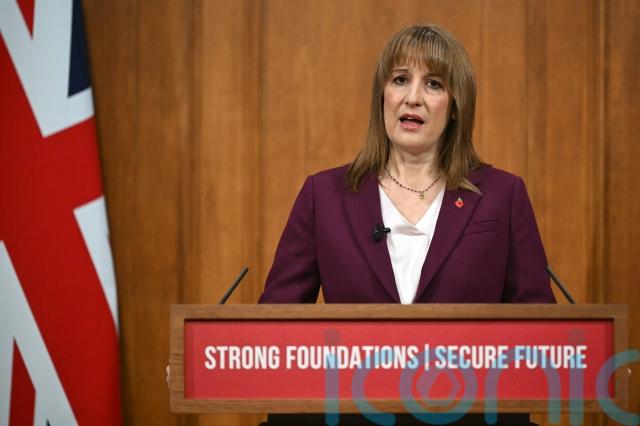
Britain’s long-term borrowing costs have edged lower after Chancellor Rachel Reeves reiterated an “ironclad” commitment to her fiscal rules, but the pound came under further pressure as she set the stage for an income tax hike.
Yields on UK government bonds, also known as gilts, fell as much as six basis points to 4.38%, while the 30-year yield dropped to its lowest level since April at 5.15% at one stage.
Gilt yields move counter to the value of the bonds, meaning their prices fall when yields rise.
But gilts soon trimmed their rally as questions continued to swirl over the upcoming November 26 Budget, with Ms Reeves’s refusing to give any firm details on what can be expected.
The yield on 10-year gilts stood just one basis point lower following the Chancellor’s unusual pre-Budget address, while on the London market, the FTSE 100 Index also dropped nearly 100 points lower.
Ms Reeves said financial markets “know my commitments to the fiscal rules is ironclad”.
She added that bringing down inflation and the cost of living would be one of the key priorities in the Budget, to help support conditions for future interest rate cuts.
The pound, which was already lower ahead of the speech, fell further after the comments to stand 0.3% lower at 1.31 US dollars and 0.3% weaker at 1.14 euros, not far off last week’s over two-year low against the single currency.
Sterling has been under pressure in recent days amid worries over the UK economy and ahead of the Bank of England’s interest rate decision on Thursday, with another cut seen as being increasingly likely.
Experts appear split on whether that cut will come in November or December, but the chances of a further reduction from 4% currently have increased as inflation is thought to have peaked now at 3.8% while the jobs market outlook looks more shaky.
Ms Reeves’s comments and pledge on inflation have fuelled expectations that cuts are on the way.
The FTSE 100 Index meanwhile fell deeper into the red after the speech, down 1% or 92.5 points lower at 9608.9.

Rachel Winter, a partner at Killik & Co, said: “UK equities are in negative territory following the Chancellor’s speech, suggesting a lack of confidence in the prospects of the UK economy.
“A higher tax burden will mean less discretionary spending and therefore less growth.”
Dan Coatsworth, head of markets at AJ Bell, said the speech had “left investors with more questions than answers, and done nothing to remove uncertainty around taxes”.
He added: “The bond market would be happy if the Chancellor raises taxes as it would help to improve public finances and make the UK less risky from an investment perspective.
“There are growing calls for the Chancellor to be crystal clear in her plans and make bolder decisions.
“No-one will be shocked at tax rises and many people believe it is better to sort the situation out once and for all, rather than keep tinkering at the edges.
“This feels like Reeves’s last chance to fix the house, otherwise her days could be numbered.”
Government borrowing rose by more than expected in the first six months of the fiscal year, while economic forecasters have recently said growth is set to be weaker next year than first thought.
Ms Reeves said Britain is also suffering from high interest costs on its £2.6 trillion of national debt.
While interest costs for government borrowers worldwide have increased, she said the UK is “particularly exposed” due to its high debt levels.
She said it is a priority to bring this down.
“The less we spend on debt interest, the more we can spend on the priorities of working people,” she said.
Subscribe or register today to discover more from DonegalLive.ie
Buy the e-paper of the Donegal Democrat, Donegal People's Press, Donegal Post and Inish Times here for instant access to Donegal's premier news titles.
Keep up with the latest news from Donegal with our daily newsletter featuring the most important stories of the day delivered to your inbox every evening at 5pm.